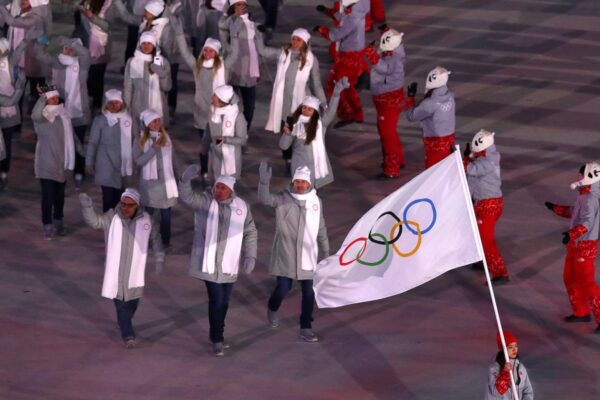The 2018 Winter Olympics has offered viewers no shortage of thrills — and some confusion.
You might have noticed a new team that is not representing any country, the OAR, is winning medals. What’s going on?
Russia was banned from this year’s Olympics because of years of systemic doping to cheat at the 2014 Winter Olympics in Sochi. However, the International Olympic Committee (IOC) granted some of the country’s athletes — 169 of them in total — “special dispensation” to compete. The catch is Russia still can’t compete as a country. Approved athletes are competing as the OAR, “Olympic Athletes from Russia.”
Yes, that means no Russian flag or logos, but the OAR decision affects more than Russian uniforms.
In short, it’s complicated, says UT professor John Hoberman, a sports historian and expert on doping.
We spoke to him to untangle how power and politics are connected to the Olympics and the measures countries will resort to for glory on the global stage.
Is this the first time that a country has been banned or that athletes have competed under a different flag?
John Hoberman: South Africa was barred from the Olympic Games from 1964 to 1988 due to its racist policy of apartheid. Some athletes competed without national identification at the 1980 Summer Olympic Games in Moscow, Soviet Union, which were boycotted by the United States and 66 other countries because of the Soviet invasion of Afghanistan.
How widespread is doping and how long has it been a problem?
JH: The doping of elite athletes with effective performance-enhancing drugs has flourished for many decades. Amphetamines were used by many European professional cyclists during the 1950s. The anabolic steroid epidemic began in the 1960s and has continued ever since. The use of the blood-boosting drug EPO by cyclists and cross-country skiers dates from the early 1990s.
The doping epidemic in elite sport is a global problem today. Athletically ambitious dictatorships such as Russia are the countries that create state-sponsored doping systems. The foundations of state-sponsored doping in today’s Russia were established decades ago in the former Soviet Union during the 1970s and 1980s.
Why would a country go to such lengths to gain glory at the Olympics?
JH: International sporting events can become political vehicles that serve the interests of governments. More generally, almost all governments subscribe to the tenets of sportive nationalism, a doctrine which holds that the production of high-performance athletes who can represent the nation on the international stage is a national security requirement that provides an important kind of prestige. I regard this doctrine as a seductive fantasy.
What are some examples of the Olympics being used as political vehicles?
JH: Every Olympiad is a unique political as well as sporting event. In this case, the use of the 2018 Games as a political instrument by a non-hosting dictatorship (North Korea) is unprecedented.
“Almost all governments subscribe to the tenets of sportive nationalism, a doctrine which holds that the production of high-performance athletes who can represent the nation on the international stage is a national security requirement.” – John Hoberman
The prototype for this kind of political use of the Olympic Games is the 1936 Berlin Summer Olympic Games, the so-called Nazi Olympics. In this case, the Hitler regime used the games both to project national greatness and to delude much of the world into believing the Nazi regime had peaceful intentions. This, of course, was a sham, but historians have concluded that this strategy was a success.
What led to Russia being banned from the 2018 Winter Olympics?
JH: The Russian doping scandal first broke in December 2014 when a German television network broadcast a documentary titled “The Doping Secret: How Russia Creates Its Champions.”
Information from Russian whistleblowers later catalyzed reports commissioned by the World Anti-Doping Agency (WADA), the premier international watchdog for monitoring athletes’s use of illicit substances, that appeared in 2015 and 2016. A year later in December 2017, after its own lengthy investigation, the International Olympic Committee (IOC) announced it was banning Russia from competing in the 2018 Pyeongchang Winter Olympics because of systematic cheating.
Why are there Russian athletes competing in the Olympics if Russia is banned?
JH: The IOC decided a total ban wasn’t fair to Russian athletes who hadn’t violated doping rules, so more than 100 Russian athletes have been permitted by the IOC to compete in the Pyeongchang Games. The IOC claims that these individual athletes have been thoroughly vetted and proved their innocence of doping.
What happens if one of these athletes wins a medal?
JH: That person will be recognized by the raising of the Olympic flag and the playing of the Olympic anthem. Any medals they win won’t go toward Russia’s medal count in the history books.
In your interview with “On Point,” you indicated that one whistleblower is hiding in fear for his life in the U.S. Are all whistleblowers of the scandal in real danger?
JH: In fact, there are three Russian whistleblowers currently in hiding, presumably in the United States. Russian officials want the primary whistleblower, Grigory Rodchenkov, extradited to Russia where he could face trial and possibly execution as a traitor. It is worth noting that two Russian anti-doping officials, both former directors of the Russian anti-doping agency RUSADA, died mysteriously in February 2016. One of them, Nikita Kamaev, had approached a British newspaper shortly before his death regarding his plan to publish a book on “the true story of sport pharmacology and doping in Russia since 1987.” This may have been a fatal mistake.
How is Russia reacting?
JH: They are denying the existence of a state-sponsored doping program.

John Hoberman is a social and cultural historian who has researched and published extensively in the fields of sports studies, race studies, human enhancements, medical history, and globalization studies. Hoberman’s work in sports studies encompasses race relations, politics and the Olympics, and performance-enhancing drug use. His interests in medical history include the social and medical impacts of androgenic drugs (anabolic steroids) and the history of medical racism in the United States. He has lectured at many medical schools and other medical institutions on this topic
Hoberman is the author of multiple books on these topics including “Sport and Political Ideology” (1984), “The Olympic Crisis: Sport, Politics, and the Moral Order” (1986), “Mortal Engines: The Science of Performance and the Dehumanization of Sport” (1992), and “Dopers in Uniform: The Hidden World of Police on Steroids” (2017).
Hoberman’s expertise has garnered widespread international media coverage and his commentary has been sought by outlets ranging from the New York Times and Wall Street Journal to network television and foreign press.




